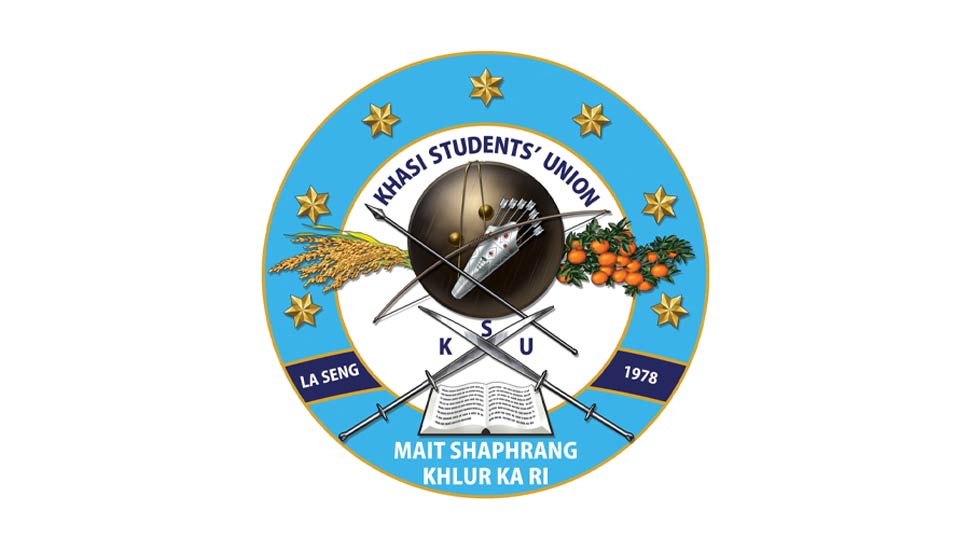Evolution of the Khasi Students’ Union

This 20 March 2022, the Khasi Students’ Union (KSU) will complete 44 years of its existence and over the past four decades of student politics and socio-political movements, the Khasi Students Union (KSU) has evolved into an institution. There was a time when the KSU was almost vanishing, but a new bunch of students emerged and take on the mantle.
In the general meeting of the students of Khasi Hills held on 11 March 1978 at Khasi National Dorbar, Mawkhar, Shillong, it was decided to create a new students’ union. Thus, the two-day long meetings of the Executive and Working committees were held on 18 and 20 March 1978 at the same venue and subsequently led to the formalization of the Khasi Students’ Union. Initially the Khasi Students’ Union composed mainly the students of the North Eastern Hill University and of twelve colleges in Shillong.
The Khasi Students Union was primarily aimed to protect and promote the miniscule Khasi tribal community. However, during the conversation with Geoffrey Basan, the founder General secretary, he expressed that the opposition by the students against the new scholarship policy of the Government was the immediate cause which brought the students together and ultimately led to the formation of the KSU. It may be mentioned that in 1978 the Government had issued the new policy in education which restricted the distribution of scholarship to only two students per family whereby the students strongly felt to be discriminatory and anti-tribal.
Since its inception the KSU had taken up various issues which are affecting the students’ community in particular and Khasi society in general. Pascal Malngiang has aptly divided the agenda of the KSU into two broad types, namely, (i) In-campus issues and (ii) off campus issues. The former included the issues relating to the welfare of the students and the latter are the larger socio-political issues. Among the major issues included in both the in-campus and off campus blocks are- (a) enhancement of scholarship and its distribution should not be constricted to two students per family (b) bus fare concession for students (c) opposing the imposition of Hindi as compulsory paper for civil service examination (d) establishment of public schools, medical and agriculture colleges, upgradation of Polytechnic into an engineering college. Whereas the off-campus issues are; (a) fencing of international border (b) repatriation of foreign nationals (c) retrieval of cantonment lands (d) Inter-State border problems (e) revival of the Dorbar (f) invocation of Inner Line Permit (g) opposition to Uranium mining (h) opposing railways (i) scrapping of the present reservation policy (j) declaration of Khasi as official language of the State and its inclusion in the 8th schedule of the Constitution of India etc.

In 1991 the collective of students desired to rediscover the essence of students’ politics in the State and under the presidentship of Banshan Sing Nongbet they vowed to make the KSU as genuinely a students’ body as possible. In the words of Paul Lyngdoh, the then General Secretary, “the KSU under the new leadership is built on a new found principle. It is now the new body of students in the truest sense of the term and it shall no longer be a group of unruly youths. However, this does not mean that we will be sitting quiet and no longer resort to public agitations when the situation is justified to do so. We will do what ought to be done, but at the same time we shall bring forward issues for larger debates and discussions within the society beforehand. We will use our intellect and adhere to the primordial principle of respect towards others and God or “tipbriew tipblei” in our various struggles, not just physical might.”
The Constitution of the Khasi Students Union prescribes that any khasi (male or female) who are in pursuit of formal education within the State of Meghalaya and outside is eligible to be a member of the Union. The structural organisation of the KSU is clearly defined in the Constitution and it was only in 1981 that the Constitution was formally adopted and the same was reviewed, redrafted and readopted in 1993. The membership enrolment takes place via two fronts- (i) educational institutions and (ii) residential localities/villages and (iii) the central leaders of the KSU are elected through elections.
Since its inception, the agitations and protests are the dominating activities of the KSU. It essentially uses two methods to press for the implementation of its demands, viz, peaceful tactics like poster campaigns, sit-in protest, writing letters and memorandums. It also resorted to aggressive or extreme methods like organizing black outs, bandhs, hunger strike, road blockade, picketing and demonstrations. At the very beginning an indefinite strike and demand day were organized. From the year 1986 onwards, the union is fully occupied with agitations and we witnessed the climax of agitational activities where public demonstrations were held in front of the State Secretariat for a considerable length of time in 1987. As a result, for several months educational institutions were closed, peace and tranquility were disrupted. Although agitations and protests are not the only activities and student leaders are also interested in sports, cultural, arts and literary programmes.
The Bogardus scale and bivariate method were employed in the research to measure the attitude towards the methods that the KSU undertook throughout their movements and also on the question of the quality of leadership. It is interesting to note here that 86% of the Khasis are for negotiation as a mean to solve the various demands, issues and conflicts. Whereas just 8% considered strike as an option and another 8% are for violent means as the way to bring forth justice. On the other hand, the KSU is not immune to criticisms as on many occasions the KSU-led movements had perhaps gone to extremes. The KSU was criticised for being parochial, exclusive and violent. Also, the participation of girls’ students has been negligible especially at the higher rung of leadership. Unlike in the beginning when the students elected Kong Bluebell Jyrwa as its first Vice President and now it has rather compartmentalized female students into a girls’ wing. On the quality of leadership, the opinion among the educated youths was sharply divided as the respondents maintained an eerie silence on the question of integrity. Whereas, 42 % are of the strong view that the students’ leaders are sensitive and another 42% saw selfishness as the major problem. Among the under graduates the numbers of respondents who believed that the KSU leadership is sensitive are as high as 66% and 24% of them said that the leaders are honest.
The KSU emerged to fill in the void. What had been neglected by the political leaders are now being voiced by the students. Back then it was strongly felt of having a strong students’ body to persistently and consistently take on the issues that matter the society and put pressure on the Government of the day. There are certain issues raised by the KSU which are commendable and it has contributed to the political discourse in the State. Regarding the involvement of the KSU with wider political issues a majority of 69% saw that the failure of political leadership as the main factor that drove the KSU to engage with critical political questions.
At 44, it is essential for the Khasi Students’ Union to embrace criticisms, to exhibit magnanimity and maturity in accepting questions, to face debates and dissents at all level and more importantly to re-imagine and draw its own future. Some of the issues and struggle that the KSU had taken up still remains since its inception. Should they remain forever? Things in the world and society have changed and are changing. Governance and politics are an on-going process and issues that matter the society will not remain the same, excepting a few. Some issues may perhaps have become obsolete and today we are being confronted with life-threatening issues like landlessness, concentration of wealth and usurpation of powers by a few tribal elites, ecological devastation, mass rural migration, complete failure in education and health care, sharp rise in unemployment and job insecurity, criminality and corruption in governance and politics, gender injustice, inequality among tribals etc. If the Khasi Students’ Union falls short in grasping these pertinent issues and fail to chart its future well, it will have no one to blame but itself.
Seemingly, the KSU looks settled and well established. But institutionalization of any kind is inherently defective and might tumble under its own weight, unless it adapts, it become transparent, accountable and open minded.
(This article is based on author’s own research work entitled- The Socio-Political Struggle of the Khasi Students Union, which was submitted to the Serampore University, West Bengal in 2000).
By | Kyrsoibor Pyrtuh

Leave a Reply